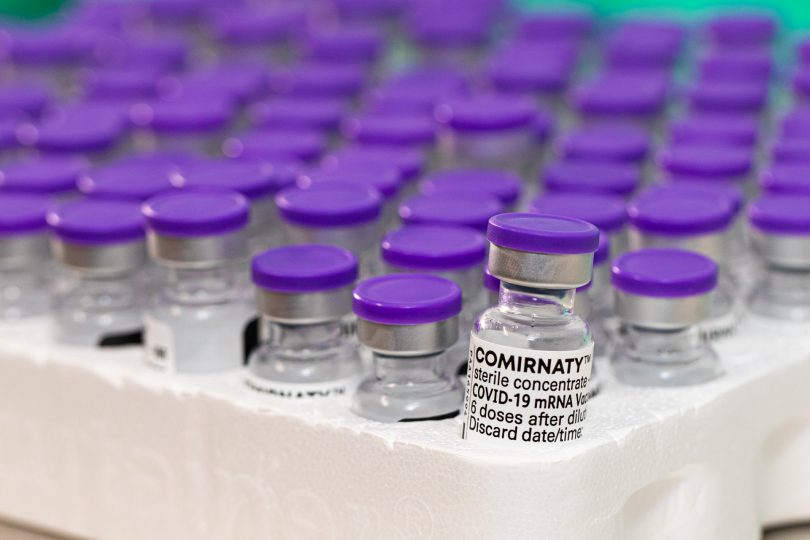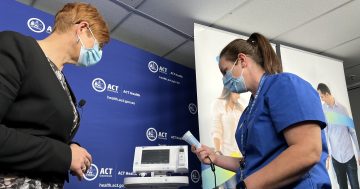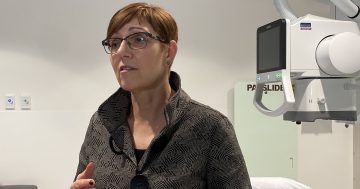
Rachel Stephen-Smith has told the Commonwealth Government to prioritise vaccinated residential aged care staff. Photo: Michelle Kroll.
ACT Health Minister Rachel Stephen-Smith has taken aim at the Commonwealth’s vaccine rollout for aged care staff, saying it was disappointing that frontline workers in the sector were not prioritised.
Ms Stephen-Smith, who has previously expressed her frustration with the rollout but remained reserved when it came to criticising the Commonwealth, said the government needed to step up and take responsibility.
“This is a Commonwealth responsibility and it is really disappointing that they have not worked harder to ensure the residential aged care and disability workforce are better identified, better communicated with and better supported to get vaccinated,” she said.
“Our officials have worked really closely with the Commonwealth to ensure we understand who has and has not been vaccinated to the greatest extent that we can [and] that we are providing lots of opportunities for people to get vaccinated.”
Criticisms from state and territory governments have continued after National Cabinet announced it would become mandatory for residential aged care and disability workers to be vaccinated by mid-September.

Residential aged care and disability care workers were eligible to be vaccinated under Phase 1A of the rollout. Photo: Michelle Kroll.
NSW Health Minister Brad Hazzard called for a vaccination blitz for workers in aged care homes after a third worker at an aged care facility in Sydney’s north-west tested positive for the virus, bringing the facilities cluster to eight. Five residents are infected.
Only one-third of the staff at the facility had been given at least one dose, despite the cohort originally scheduled to be vaccinated by Easter.
“We could not quite understand why the federal government sent teams into facilities to vaccinate residents but not staff,” Mr Hazzard told ABC Radio this morning (6 July).
Ms Stephen-Smith said the Commonwealth’s failure to prioritise workers has now put aged care facilities in a precarious position.
“What that tells me is that they have not prioritised that, they did not prioritise it early enough and they have not put enough effort into working out how logistically they were going to not just offer, but ensure to the best possible extent, that they could get those staff vaccinated.
“They simply have not worked out the logistics about how to get staff vaccinated.”
When asked if a three-month leeway was too long as COVID-19 starts to creep into aged care settings at the moment, Ms Stephen-Smith said it was a shame it had not been prioritised earlier as vaccinations could not happen overnight.
“I think there are some challenges in trying to vaccinate all staff all at once when you are going into a residential aged care facility,” she said.
“Given where we are now, what we cannot afford to see is the really quick introduction of mandatory vaccinations which would reduce the available workforce for residential aged care.
“You also need to recognise that with the different vaccines, quite a number of people will have a short-term adverse reaction to that, which might mean that they need to take a day or two off work.”
This would exacerbate staffing pressures in an industry that already struggles with staffing numbers, retention and low pay rates, Ms Stephen-Smith said.
Workforces can be impacted by as much as 30 to 50 per cent if the vaccination mandate for staff came into effect too quickly, she said.
At the end of last month, National Cabinet agreed to an $11 million scheme to help residential aged care facilities vaccinate their staff.
Around two-thirds of aged care workers had not received a single jab, while a little over one in six staff had been fully vaccinated just before the announcement was made.
The Federal Department of Health has not responded to a request by Region Media for updated and ACT-specific data.
A flat fee of $80 per staff member will be made available for casual staff going off-site for vaccination. Up to $500 will be made available for facilities to organise off-site vaccination for employees, including transport services and arranging groups of staff to be vaccinated.
Casual staff will also receive one day’s paid sick leave at a rate of $185 if they become unwell after vaccination and do not have other leave entitlements, but this will only be available for up to 25 per cent of the provider’s total casual staff.
Ms Stephen-Smith said the Commonwealth needed to figure out how it would provide more in-reach vaccination programs to ensure staff and residents were vaccinated.
“There are a lot of people in residential aged care who were not at the facility the day the in-reach came in or might not have felt confident because it was early in the rollout,” she said.
“The Commonwealth needs to ensure it is going back into those facilities and give people who were not vaccinated the first time around the opportunity to get vaccinated now.”





















